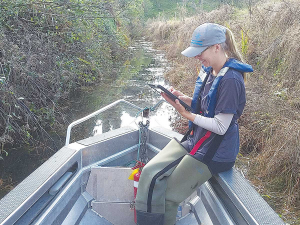Environment Canterbury urges buyers to check wastewater systems on rural properties
Buying or building a rural or semi-rural property? Make sure you know where the wastewater goes, says Environment Canterbury.
 Bay of Plenty Regional Council contractor Courtney Williams assisting whitebait research in a small stream flowing into the Aongatete River, near Katikati.
Bay of Plenty Regional Council contractor Courtney Williams assisting whitebait research in a small stream flowing into the Aongatete River, near Katikati.
Purpose-built ponds that provide a safe haven for whitebait are being hailed as a success by Bay of Plenty Regional Council staff, following the results of a recent overnight trapping operation.
The trapping confirmed that the newly created habitat on the banks of the Whakatāne River has been very successful – whitebait were found in abundance using the ponds, as were bully, shortfin and longfin eels, juvenile mullet, and triplefins.
The ponds were excavated in autumn 2020 by the council’s rivers and drainage team near the Ferry Road access point. The area surrounding the small, interconnected ponds was then planted with more than 3,000 native plants and shallow areas were created around them to improve possible spawning areas.
They’re connected to the river by small channels to allow tidal fluctuations that regularly refresh the pond system, and have been designed to retain plenty of water, even at low tide. The ponds are located alongside a low-lying wet area that already has good wading bird habitat.
Rivers and drainage operations manager Bruce Crabbe said that these grassed areas within man-made stopbanks are a common sight across Bay of Plenty farming areas.
“This work is part of our move to improve the amenity and better reflect the natural river movements and native habitats that they foster. It is great to see how well this particular spot has worked. From almost the very start we saw small inanga species in the ponds, but there are just so many more now and a wide range of other native species as well. It is a real win,” Crabbe said.
Graduate environmental scientist Erin Bocker worked with Regional Council’s freshwater ecologist, Alistair Suren on the research. She said that the results had “exceeded expectations”.
“We deployed six fyke nets and 12 gee-minnows overnight and found a very healthy population of white bait, but common bully, shortfin and longfin eels, juvenile mullet, and triplefins were using the ponds as well.
“The ponds appear to be successfully acting as a refuge and nursery for a range of fish species and this habitat value will increase further as the plants grow and establish around the ponds.
“It’s an important example of how available fish habitat can be enhanced, while maintaining flood protection. So we [the science team] will continue to monitor this site and others like it to guide future projects,” Bocker said.
The council is asking that people don’t net whitebait or fish in the ponds so the juveniles have a chance to develop.
The sale of Fonterra’s global consumer and related businesses is expected to be completed within two months.
Fonterra is boosting its butter production capacity to meet growing demand.
For the most part, dairy farmers in the Waikato, Bay of Plenty, Tairawhiti and the Manawatu appear to have not been too badly affected by recent storms across the upper North Island.
South Island dairy production is up on last year despite an unusually wet, dull and stormy summer, says DairyNZ lower South Island regional manager Jared Stockman.
Following a side-by-side rolling into a gully, Safer Farms has issued a new Safety Alert.
Coming in at a year-end total at 3088 units, a rise of around 10% over the 2806 total for 2024, the signs are that the New Zealand farm machinery industry is turning the corner after a difficult couple of years.